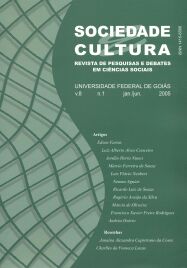Neutralidade ou impregnação teórica na observação: implicações metodológicas nas ciências sociais
DOI:
https://doi.org/10.5216/sec.v8i1.993Resumo
Há uma dicotomia metateórica essencial na filosofia da ciência e nas ciências da cognição que apresenta importantes implicações metodológicas nas ciências sociais: a distinção entre enunciados puramente observacionais e enunciados “carregados” teoricamente. A defesa de cada alternativa repercutiu na definição dos fundamentos e métodos da ciência empírica, com especial ênfase no questionamento da objetividade. Embora a tese de que a observação seja, pelo menos, lingüística e socialmente condicionada prevaleça no campo das ciências sociais, a procura de uma “base empírica” reaparece, principalmente na crítica de um relativismo radical que decorreria da aceitação da tese da “impregnação” teórica. O problema torna-se mais relevante em tendências como a etnometodologia ou o construcionismo social, que praticamente negam a possibilidade de uma descrição “objetiva” da experiência ou do mundo. Palavras-chave: teoria; observação; objetividade científica; relativismo; metodologia das ciências sociais.Downloads
Não há dados estatísticos.
Downloads
Publicado
2007-12-05
Como Citar
NUNES, JORDÃO HORTA. Neutralidade ou impregnação teórica na observação: implicações metodológicas nas ciências sociais. Sociedade e Cultura, Goiânia, v. 8, n. 1, 2007. DOI: 10.5216/sec.v8i1.993. Disponível em: https://revistas.ufg.br/fcs/article/view/993. Acesso em: 16 fev. 2026.
Edição
Seção
Artigos Livres
Licença
Autores/as que publicam nesta revista concordam com os seguintes termos:
- Autores/as mantêm os direitos autorais e concedem à revista o direito de primeira publicação, sendo o trabalho simultaneamente licenciado sob a Creative Commons Attribution License, o que permite o compartilhamento do trabalho com reconhecimento de autoria e da publicação inicial nesta revista.
- Autores/as têm autorização para assumir contratos adicionais separadamente, para distribuição não exclusiva da versão do trabalho publicada nesta revista (ex.: publicar em repositório institucional ou como capítulo de livro), com reconhecimento de autoria e da publicação inicial nesta revista.
- Autores/as têm permissão e são estimulados/as a publicar e a distribuir seu trabalho online (ex.: em repositórios institucionais ou na sua página pessoal) a qualquer ponto antes ou durante o processo editorial, já que isso pode gerar alterações produtivas, bem como aumentar o impacto e a citação do trabalho publicado (veja O Efeito do Acesso Livre).


 Esta revista está licenciada sob a licença
Esta revista está licenciada sob a licença 
